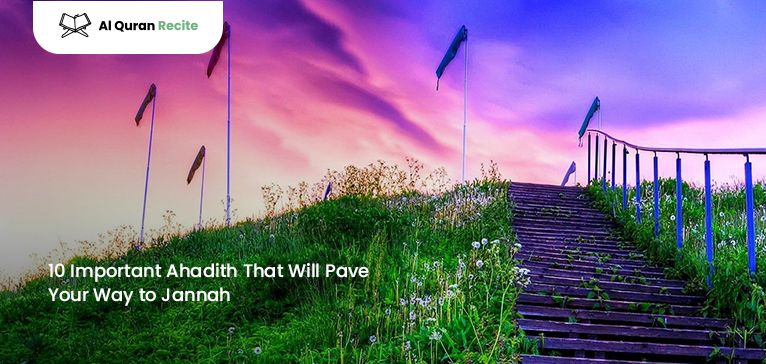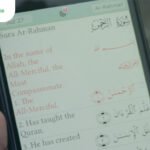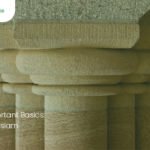Praise is due to Allah the Almighty, Peace, and Blessings of Allah be upon the Prophet Muhammad, his Family, his Companions and whosoever follows him.
The first and foremost desire of a believer is no other than seeking blessings of Allah Subhana hu Wata’la. So, no one denies the perpetual peace and divine benedictions of Jannah? Certainly no one.
I have listed 10 important Ahadith that pave your way to Jannah. These are the most rewarding, the most precious, the most correct ones. May Allah Subhana hu Wata’la bless us, bless those who read, and bless those who share it as well.
1. First Hadith-e-Mubarak
Abu Hurairah (May Allah the Almighty be pleased with him) narrated that the Messenger of Allah Subhana hu Wata’la (Peace and blessing of Allah be upon him) said:
“لئن أقول سبحان الله والحمد لله ولا إله إلا الله والله أكبر أحبُ إليّ مما طلعت عليه الشمس”
The uttering of the words “Subhan Allah”, “Al-hamdu lillah”, “La ilaha illa-Allah” is dearer to me than anything over which the sun rises. (Muslim)
Interpretation:
These three words are the most cherished and rewarding. So, the Holy Prophet (PBUH) loves to utter as much as possible. Those three words are Subhan Allah which means Allah is free from imperfection, Al-hamdu lillah which refers that all praise is due to Allah, and La ilaha illa-Allah that is Allah is great. So, a Muslim should utter them.
2. Second Hadith-e-Mubarak
Again Abu Hurairah (May Allah the Almighty be pleased with him) narrated that the Messenger of Allah Subhana hu Wata’la (Peace and blessing of Allah be upon him) said:
“مَنْ قَالَ سُبْحَانَ اللهِ وَبِحَمْدِهِ، فِي يَوْمٍ مَائَةَ مَرَّةٍ، حُطَّتْ خَطَايَاهُ، وَإِنْ كَانَتْ مِثْلَ زَبَدِ الْبَحْرِ”
Whoever says: “Subhana-Allah wa bi-Hamdihi” one hundred times in a day will have his wrong actions taken away from him, even if they are as abundant as the foam on the sea. (Agreed upon).
Interpretation:
In this Hadith Mubarak Abu Hurairah (May Allah the Almighty be pleased with him) narrated again another “Tasbih” that Muslims can utter and get their mistakes forgiven. So, uttering these words will please Allah Subhana hu Wata’la so much that He will forgive utterer’s wrongdoings even if they were as much as foam on ocean.
3. Third Hadith-e-Mubarak
Abu Hurayra (may Allah the Almighty be pleased with him) narrated that the Messenger of Allah (Peace and Blessings of Allah be upon him) said:
“من صلّى عليّ صلاة صلّى الله عليه بها عشراً”
Whoever utters Salah upon me, Allah sends Salah upon him ten times. (Muslim)
Interpretation:
The Holy Prophet (PBUH) is the dearest prophet to Allah Subhana hu Wata’la. So, Allah Subhana hu Wata’la pays homage his beloved prophet by uttering “Salah.” On the other hand, it is recommended to all believers that they should also send “Salah” upon him so that believers may get the mercy of Allah Subhana hu Wata’la.
4. Fourth Hadith-e-Mubarak
Abu Hurayra (may Allah the Almighty be pleased with him) narrated that the Messenger of Allah (Peace and Blessings of Allah be upon him) said:
“كَلِمَتَانِ خَفِيفَتَانِ عَلَى اللِّسَانِ، ثَقِيلَتَانِ فِي الْمِيزَانِ، حَبِيبَتَانِ إِلَى الرَّحْمنِ: سبْحَانَ اللهِ وَبِحَمْدِهِ سُبْحَانَ اللهِ الْعَظِيمِ”
There are two expressions that are easy to utter yet very heavy in the balance and dearer to Allah Subhan hu Wata’la, and they are Subhana Allah Al Azim and Subhan Allah wa bi-Hamdihi.
Interpretation:
Allah Subhan hu Wata’la offers many reward-winning acts so that believers can attain his mercy somehow. That’s why the Holy Prophet (PBUH) has taught us these two words so that we can achieve a better place in this world and hereafter.
5. Fifth Hadith-e-Mubarak
Abu Hurayra (may Allah the Almighty be pleased with him) narrated that the Messenger of Allah (Peace and Blessings of Allah be upon him) said:
“أَلاَ أدلكم بِمَا إِنْ أَخَذْتُمْ بِهِ أَدْرَكْتُمْ مَنْ سَبَقَكُمْ وَلَمْ يُدْرِكْكُمْ أَحَدٌ بَعْدَكُمْ، وَكُنْتُمْ خَيْرَ مَنْ أَنْتُمْ بَيْنَ ظَهْرَانَيْهِمْ، إِلاَّ مَنْ عَمِلَ مِثْلَهُ تُسبِّحُونَ دبر كل صلاة ثلاثاً وثلاثين وَتَحْمَدُونَ ثلاثاً وثلاثين وَتكبِّرُونَ ثلاثاً وثلاثين وتقول تمام المائة لا إله إلا الله وحده لا شريك له الملك وله الحمد وهو على كل شيء قدير”
Shall I not tell you a thing upon which if you acted you would catch up with those who have exceeded you? Nobody would overtake you and you would be better than the people amongst whom you live except those who would do the same: say after every prayer Subhan Allah thirty-three times, Alhamdulillah thirty-three times, Allahu Akbar thirty-three times and complete the hundred.
Interpretation:
Uttering some pious words will add considerable valuation in the balance in Akhirah. Believers are encouraged to increase their weightage of good deeds. So, it is recommended by our beloved Prophet (PBUH) to utter these words after every prayer.
6. Sixth Hadith-e-Mubarak
Anas (may Allah the Almighty be pleased with him) narrated that the most frequent invocation of the Prophet (Peace and Blessings of Allah be upon him) was:
“اللهُمَّ آتِنَا فِي الدُّنْيَا حَسَنَةً، وَفِي الآخِرَةِ حَسَنَةً، وَقِنَا عَذَابَ النَّارِ”
O, Allah! Give to us in the world that which is good and in the Hereafter that which is good, and save us from the torment of the Fire. (Muslim)
Interpretation:
All believers wish that they get the highest rank in the Jannah as well as have enough in this world. If a person has enough resources in this world, he will help others. This is an act of virtue. On the other hand, believers want best place hereafter. So, they should make this supplication.
7. Seventh Hadith-e-Mubarak
Abu Musa (may Allah the Almighty be pleased with him) narrated that the Messenger of Allah (Peace and Blessings of Allah be upon him) said to him:
“يا عبد الله بن قيس: أَلاَ أَدُلُّكَ عَلَى كَنْزٍ مِنْ كُنُوزِ الْجَنَّةِ؟! » قُلْتُ: “بَلَى يَا رَسُولَ اللهِ”، قَالَ: «لاَ حَوْلَ وَلاَ قُوَّةَ إِلاَّ بِاللهِ”
O Abdullah Bin Qais! should I not direct you to a treasure from amongst the treasures of Paradise? I said, Allah’s Messenger, do it, of course. Then he (PBUH) said: then, recite: “La haul a wala quwwat illa bil-lah.” (Muslim)
Interpretation:
This utterance testifies that there is no might and no power but that of Allah Subhana hu Wata’la. This refers to the claim and faith that nothing can happen without the permission of Allah Subhana hu Wata’la. a believer must testify this by heart as well as by actions.
8. Eighth Hadith-e-Mubarak
The mother of believers; Juairiyah bint al-Harith (May Allah be pleased with her) narrated that the Messenger of Allah (Peace and Blessings of Allah be upon him) said:
“لَقَدْ قُلْتُ بَعْدَكِ أَرْبَعَ كَلِمَاتٍ ثَلاثَ مَرَّاتٍ لَوْ وُزِنَتْ بِمَا قُلْتِ مُنْذُ الْيَوْمِ لَوَزَنَتْهُنَّ: سُبْحَانَ اللَّهِ وَبِحَمْدِهِ، عَدَدَ خَلْقِهِ، وَرِضَا نَفْسِهِ، وَزِنَةَ عَرْشِهِ، وَمِدَادَ كَلِمَاتِهِ”
Since leaving you have said four phrases which if weighed against all you have said today, would prove to be heavier: “Subhan-Allahi wa bihamdihi, `adada khalqihi, wa rida Nafsihi, wa zinatah `Arshihi, wa midada Kalimatihi
Interpretation:
This Hadith-e-Mubarak refers to four virtuous phrases that earn great rewards that will bring you nearer to Allah Subhana hu Wata’la. So, believers should practice and utter these precious phrases.
9. Ninth Hadith-e-Mubarak
Shaddad bin Aus (May Allah be pleased with him) narrated that the Messenger of Allah (PBUH) said:
“سيد الاستغفار أن تقول: اللَّهُمَّ أَنْتَ رَبِّي لا إِلَهَ إِلا أَنْتَ، خَلَقْتَنِي وَأَنَا عَبْدُكَ، وَأَنَا عَلَى عَهْدِكَ وَوَعْدِكَ مَا اسْتَطَعْتُ، أعوذ بك من شر ما صنعت أَبُوءُ لَكَ بِنِعْمَتِكَ عَلَيَّ، وَأَبُوءُ لَكَ بِذَنْبِي، فَاغْفِرْ لِي؛ فَإِنَّهُ لا يَغْفِرُ الذُّنُوبَ إِلا أَنْتَ”
The best supplication for seeking forgiveness is to say: O Allah You are my Rubb. There is no true God except You. You have created me and I am Your slave, and I hold to Your Covenant as far as I can. I seek refuge in You from the evil of what I have done. I acknowledge the favors that You have bestowed upon me, and I confess my sin. Pardon me, for non You has the power to pardon.
Interpretation:
In this Hadith-e-Mubarak some phrases are recommended that are ranked as the best supplication for seeking forgiveness. Allah Subhana hu Wata’la likes believers seeking forgiveness and bowing before Him accepting Him the mightiest one.
10. Tenth Hadith-e-Mubarak
Abu Hurairah (may Allah the Almighty be pleased with him) narrated that the Messenger of Allah (Peace and Blessings of Allah be upon him) said:
“مَنْ قَالَ لاَ إِلهَ إِلاَّ اللهُ وَحْدَهُ لاَ شَرِيكَ لَهُ، لَهُ الْمُلْكُ وَلَهُ الْحَمْدُ وَهُوَ عَلَى كُلِّ شَيْءٍ قَدِيرٌ فِي كُلِّ يَوْمٍ، مَائَةَ مَرَّةٍ كَانَتْ لَهُ عَدْلَ عَشْرِ رِقَابٍ، وَكُتِبَتْ لَهُ مَائَةُ حَسَنَةٍ، وَمُحِيَتْ عَنْهُ مَائَةُ سَيِّئَةٍ، وَكَانَتْ لَهُ حِرْزًا مِنَ الشَّيْطَانِ، يَوْمَهُ ذلِكَ، حَتَّى يُمْسِي وَلَمْ يَأْتِ أَحَدٌ بِأَفْضَلَ مِمَّا جَاءَ بِهِ، إِلاَّ أَحَدٌ عَمِلَ أَكْثَرَ مِنْ ذَلِكَ”
Whoever said: “there is no god but Allah Subhana hu Wata’la, without any partner. The kingdom and praise belong to Him and He has power over everything.” One hundred times a day, it is the same for him as freeing ten slaves, one hundred good actions are written for him, and one hundred wrong actions are removed and it is protection from shaytan for that day until the night. No one does anything excellent than what he does except someone who does more than that. (Bukhari)
Interpretation:
Often, we ignore small deeds, yet they hold great importance. So, the beloved Prophet (PBUH) has taught us such small virtuous phrases. These phrases help to make our hearts and soul more pious and contended.
Conclusion
Believers must think about small deeds. These small virtuous deeds make a bounty of piousness. So, we should utter small phrases and words so that we can attain His ultimate mercy and blessings.




